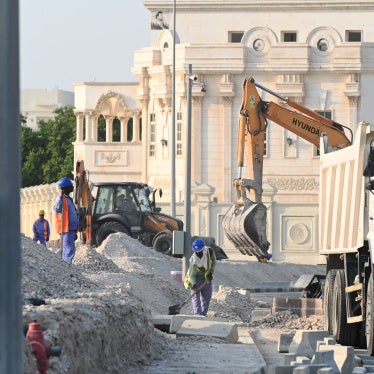(New York) – Egypt should allow those fleeing Syria full access to the UN refugee agency to have their asylum claims properly examined, and should also allow Syrians already registered with the UN body to reenter the country after periods abroad, Human Rights Watch said today.
Without prior warning, on July 8, the Egyptian government changed its entry policy for Syrians arriving in Egypt by requiring them to obtain a visa and security clearance before arriving in the country. According to media reports, on the same day Egypt denied entry to 276 people arriving from Syria, including a plane with Syrian nationals on board, who were then flown back to the Syrian town of Latakia. The new policy has also left several Syrians stranded in Alexandria’s international airport, including at least three people already registered as asylum seekers with the United Nations High Commissioner for Refugees (UNHCR) in Egypt, who say the authorities plan to return them to the countries from which they arrived.
“Egypt may be going through tumultuous times, but it must not return anyone, including Syrians, to somewhere threatening their life or freedom,” said Nadim Houry, deputy Middle East director at Human Rights Watch. “While the Egyptian government can require foreign nationals to obtain visas before arriving in Egypt, it must properly protect them. Egypt should continue to allow those fleeing from Syria to lodge asylum claims with UNHCR and receive protection.”
To date, UNHCR in Egypt has registered, or is in the process of registering, some 90,000 asylum seekers from Syria.
On its official Facebook page, Egypt’s Ministry of Foreign Affairs confirmed that a new visa policy had been implemented but said the decision was temporary, and a result of the current unrest in the country. According to one media account, airport officials also said that the new requirement followed reports that Syrians in Egypt were supporting the Muslim Brotherhood, and that some had participated in violent protests following President Mohamed Morsy’s removal from power.
Under international refugee and human rights law, the Egyptian government may not send anyone back to a place threatening their life or freedom, or where they risk inhuman or degrading treatment or torture. Before deporting anyone to Syria, Egypt should therefore guarantee all asylum seekers from Syria access to UNHCR which, under a 1954 agreement with Egypt, conducts refugee status determination procedures in the country.
Egypt should also guarantee the right of all Syrians already registered as asylum seekers in Egypt to freely move in and out of the country. Human Rights Watch said that refusing such people reentry into Egypt after travel abroad would expose them to the risk of getting stuck in limbo, with no country allowing them entry.
Two Syrians told Human Rights Watch that they’ve been trapped at Alexandria’s international airport since July 8, despite being registered as asylum seekers with UNHCR in Egypt. One woman who spoke to Human Rights Watch explained that she’d been residing in Egypt with her family for nearly six months, but that she recently had to travel with her mother to renew their passports in Amman, Jordan. After renewing their passports, they returned to Egypt from Amman. But when they arrived at the airport in Alexandria on July 8, an airport official informed them they would not be allowed into the country because of the new visa rules – despite the fact that they are registered asylum seekers.
In addition to her fear of being separated from her family, including her three daughters and husband who reside in Alexandria, the woman told Human Rights Watch that she was concerned about her mother’s health. She said her mother suffers from diabetes and that she was running out of the medication she needs to manage her condition. According to the daughter, her mother requested to see a doctor in the airport, and while one was provided for her, he was not able to give her the medication she needs.
Under international human rights law, Egypt is obliged to protect the right to health of everyone within its territory, including ensuring, as a core minimum obligation, access to essential medication.
A Syrian man, who also told Human Rights Watch that he is registered as an asylum seeker with UNHCR in Egypt, was also being held in Alexandria airport. He said he came to Egypt from Saudi Arabia, where he works, to see his family members who have resided in Egypt for the past seven months. He said airport officials told him that he would not be allowed entry because of the new visa rules, and that he would be returned to Saudi Arabia.
“While Egypt is going through a very difficult period, it simply should not strand Syrians this way, especially those who have fled such a devastating conflict at home,” Houry said.







